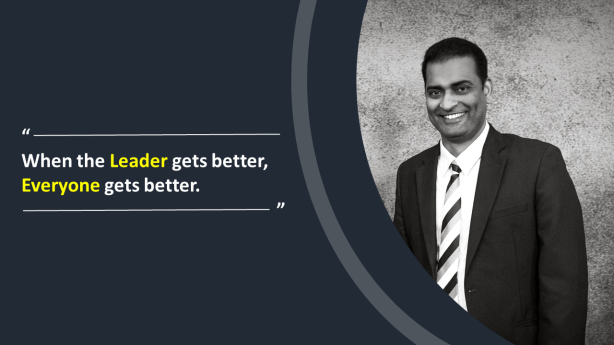
Remember Everyone in the organization is Important:
Every team member is important in the organization. Every player has value but not every player has got equal value. An experienced person may have the gift of wisdom/experience as there is no shortcut to achieving wisdom. Sometimes the amount of time spent in an organization tends to equal to wisdom. But the downside of it according to Andy Stanley is the longer time spent in the organization erodes awareness. In other words the longer we are in an organization, we tend to stop seeing the problems and just accept them.
This is where a new team member would be incredibly valuable. So you need to tell your new team members that they are really valuable in the early days. Because they will never be more objective than they are soon after joining the organization. That is why I tell our new team members often that first 45 days in the team is when they are going to be most objective before they start accepting things as they are. So we want them to know that every team member has value. We are going to learn from the senior’s experience and we are also going to learn from rookies fresh perspective and together everyone gets better.
The most important thing we should do at our workplace is to
- Hire them right
- Train them right
- Treat them right
I want to see my staff attending office every morning not because they have to but because they want to. Because we make them feel that they know they matter because of the way they are treated, respected, involved and listen to. During my initial days of leadership, I often wonder how can I do that? Later I learned that the best way to ensure people matter to us is to just tell them. Common sense right? You love your wife and you just tell her and your life will get a lot better !! You love your kids and parents and you just tell them. It’s easy.
Begin with the end in mind:
As a leader, one of the most important skills that we can develop is identifying, empowering and developing the right people. Nothing more important than who you bring in through the front door to work for your company. Who do you hire? We need to get that right. We need to be careful about it. If we get this wrong every day we have to deal with bad attitudes, non-performers and all kinds of bad things and negativity.
The potential of your organization rests on the strengths of its people. You can have the best product, best strategy, or best vision, but without the best people, your organization will always be limited!
Jim Collins said it this way: “People are not your most important asset. The right people are.”
Zig Ziglar says “You don’t build a great business, you build people then people build the business”.
Craig Groeschel says “You don’t need a large, successful organization to attract great people. You need a vision worth following.”
When you’re writing a job description, be clear about what type of person you want—don’t just list duties, list characteristics the person needs to have. This one sounds simple, but many of us overlook it. A general idea of what you want won’t help you fill a specific role. We always hire for the future and not for the present.
I always look within our organization before looking outside. If you want to guard the culture, hire from within as often as possible.
Be Ruthless:
The best time to fire someone is before you hire them. Making no hire is better than making a bad hire. The cost of hiring a bad team member is greater than the cost of missing a good one. Wrong hires recruited early will make it more difficult to make great hires later into the team.
We have the most rigorous selection process with multiple rounds. Why so rigorous? Because we won’t settle for anything but the best people!! My interview questions all fall under four main categories: skill, value, behavior, and character. In my experience, most companies only focus on skill and character. The best predictor of future success is past success. You can learn a lot from the past. If you find someone who is crazy talented but has vastly different values or behavior’s, they’re not a great fit! Make sure you ask questions geared toward your core values and don’t be afraid to put candidates in real-life situations to test them. If they don’t have the skills yet, but they fit your values, go all-in!
Try reverse-interviewing to help prospective employees understand the job expectations and ensure the job is a match for them. The prospect interviews the people who would be their colleagues about the job, the culture and anything else they’re interested in. The employees being interviewed don’t ask questions but focus on responding to the prospect. These sessions usually last 30-45 minutes.
If possible, give candidates an opportunity to test the job for a day. To ensure that prospects truly understood what the job would be like and what it would feel like to work in the office with their new colleagues, after receiving an offer and prior to accepting they are invited to shadow someone in the role and ask questions. The goal is to give the prospect a truly realistic representation for what the work will be like before they accept the offer. This reduces miscommunication about the job.
Never hire someone out of desperation and I have learned this the hard way after making few mistakes. Be careful when you find yourself talking yourself into hiring a candidate. When you see something that concerns you about a candidate, don’t try to make excuses for them—dig in! If the right person isn’t there, it’s not the right time to hire. Once you complete your hiring create magic with training and it will help you make your people your brand.
Bill Hybels in his Courageous Leadership book says “Hire people for their character, competency & chemistry”
- Character – What do they stand for
- Competency – Knowledge, skills, and tools to get the job done
- Chemistry – Do I like this person?
Do not ever underestimate the value of Chemistry. If you like their character and competency and don’t like them then I suggest not to make the hire because chemistry matters too.
According to Warren Buffet, we should look for integrity, intelligence, and energy while recruiting someone into the organization. He says without the first one the other 2 will kill you. Patrick Lencioni in the book the ideal team player says to recruit people who are hungry, humble and smart.
Burn the free fuel:
John Maxwell says a man does not live on bread alone, sometimes he needs a little buttering up. No matter what each one of us says everyone needs appreciation, recognition and encouragement.
Appreciation – Recognition – Encouragement. That to me is the fuel that drives human performance. Ask the below questions to yourself.
- Do you want to be appreciated? – Yes
- Do you want to be recognized? Absolutely
- Do you want to be encouraged? Yes by all means
The number one reason why people leave companies is that they do not feel valued. That is why as a leader I have a rule in appreciating people. My rule goes like this. What I want to do is to appreciate more than I think I should. Appreciate more than I think I should and then double it. Never rob your team member of the blessing of knowing that you notice and you care.
Finally in Craig Groeschel words….
When the leader gets better everyone gets better
Remember, you don’t have to know it all to be a great leader! Be yourself. People would rather follow a leader who is always real than one who is always right.
Resources:
- Craig Groeschel Leadership Podcast
- Creating Disney Magic Podcast with Lee Cockerell
- Courageous Leadership – Bill Hybels
- Ideal Team player – Patrick M. Lencioni

